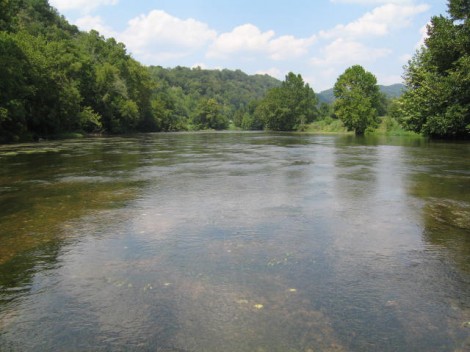Musseling on the Clinch River
Tuesday, August 19th, 2008We at the Network are desk jockeys. We spend the majority of our time behind a computer writing letters, researching policy, talking to members and people in the community facing threats to their clean water resources. Rarely do we get outside. Yesterday was an exception.
Craig Walker, an ecologist, invited the staff of TCWN to go musseling on the Clinch River. I have never seen a freshwater mussel up close and person. I must say, it was luv.
We started the day with a lecture complete with textbook and quiz.
After a drive to the Clinch River, we were treated to a great day of snorkling, mussel identification and riverside lunch. We snorkeled in about a foot of water, but we came to the river in 5mm wetsuits, fins, snorkel gear and weight belts. The guy at the dive shop told us the river would be freezing and we’d need weight belts go with the very large wetsuit so we could get down far enough to see the mussels. Most of that gear was left in the car.
The biodiversity was amazing. We saw hundreds of snails of different types, rare, endangered and threatened mussel species, darters galore. I had never appreciated mussels as I did slowly drifting down the river only to stop and hike back up and do it all over again.
Mussels have no eyes so their strategies for feeding and reproduction rely on sensory abilities I have no idea about. It’s marvelous really to watch them close and open to changes in their environment that we could not perceive. We saw a number of them with a foot hanging out. Darters and Mad Toms were curious. If we stayed still enough they would come close to check us out these beings with weird smooshed faces and long breathing tubes.
None wanted to leave, but our desks were calling us. Dana had to get to Enterprise Rental Car before it closed to get a car for today’s Water Quality Control Board meeting in Nashville. I had to check a million emails and phone messages from my vacation last week. Greg and Morgan had to prepare for one last day of freedom before classes start. Only Craig could leave the river knowing he’d be back for mussel surveys.



